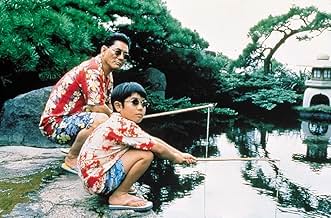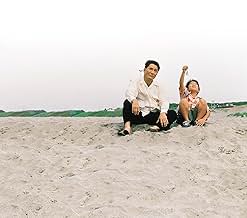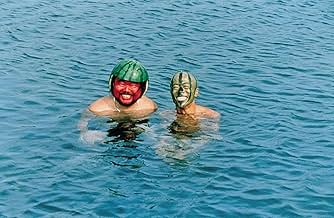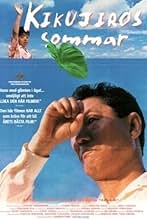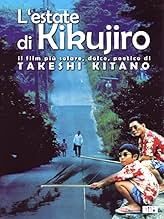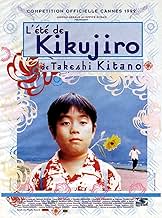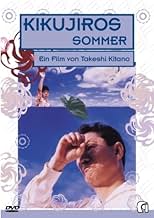CALIFICACIÓN DE IMDb
7.7/10
23 k
TU CALIFICACIÓN
Un muchacho joven e ingenuo emprende el camino solo en busca de su madre rebelde. No tarda en encontrar un dudoso protector en un hombre cascarrabias, y ambos viven una serie de aventuras in... Leer todoUn muchacho joven e ingenuo emprende el camino solo en busca de su madre rebelde. No tarda en encontrar un dudoso protector en un hombre cascarrabias, y ambos viven una serie de aventuras inesperadas en el camino.Un muchacho joven e ingenuo emprende el camino solo en busca de su madre rebelde. No tarda en encontrar un dudoso protector en un hombre cascarrabias, y ambos viven una serie de aventuras inesperadas en el camino.
- Premios
- 4 premios ganados y 4 nominaciones en total
Takeshi Kitano
- Kikujiro
- (as Beat Takeshi)
The Great Gidayû
- Biker
- (as Gurêto Gidayû)
Beat Kiyoshi
- Man at Bus Stop
- (as Bîto Kiyoshi)
Yôji Tanaka
- Yakuza Henchman
- (as Yoji Tanaka)
- Dirección
- Guionista
- Todo el elenco y el equipo
- Producción, taquilla y más en IMDbPro
Opiniones destacadas
10nizsu
I have heard a lot of people said that this film was not recognized as much as his other films. What a shame! When I saw the tittle of the film, I was surprised. The tittle is Kitano's father name.
In Kitano's biography, it is said that "Kitano's father was an alcoholic and would spend most of the money he earned on alcohol, and when he had been drinking, he would become violent and beat up both his wife and his kids. Eventually, Kikujiro left his family".
I know Kitano Takeshi made this film because he has been tired of violence/gangsters/life&death in his previous film, but what made him writing a story about his father-a man who abandoned his family when Kitano was young. If you read Kitano Takeshi's biography, you should see his childhood memory in Masao. Kikujiro ( in the film) is a corrupted person. But also in the film, Masao eventually respects and loves to play with that childish man who keeps smoking and shouting at people. Does Kitano himself desire a father too much, so he is willing to accept his father's bad habits as long as his father is still at his side.
It is not really a film I'd say, I feel like I am seeing the characters in real life. From the start, Masao has drawn Kikujiro in his diary. The ending is also the beginning. Kitano didn't make a happy ending nor a sad ending. Our 3 hours is just to see the beginning of a father-and-son relationship which would grows by the time. Remember, Masao just knew Kikujiro's name in the end of the film, and Kikujiro said: "Let's do it again some time". The cycle of life in "Kikujiro" go on forever. The feeling is too real. I have forgot that I were watching a movie. There is no simple words that can describe this movie completely, u have to watch it by yourself
In Kitano's biography, it is said that "Kitano's father was an alcoholic and would spend most of the money he earned on alcohol, and when he had been drinking, he would become violent and beat up both his wife and his kids. Eventually, Kikujiro left his family".
I know Kitano Takeshi made this film because he has been tired of violence/gangsters/life&death in his previous film, but what made him writing a story about his father-a man who abandoned his family when Kitano was young. If you read Kitano Takeshi's biography, you should see his childhood memory in Masao. Kikujiro ( in the film) is a corrupted person. But also in the film, Masao eventually respects and loves to play with that childish man who keeps smoking and shouting at people. Does Kitano himself desire a father too much, so he is willing to accept his father's bad habits as long as his father is still at his side.
It is not really a film I'd say, I feel like I am seeing the characters in real life. From the start, Masao has drawn Kikujiro in his diary. The ending is also the beginning. Kitano didn't make a happy ending nor a sad ending. Our 3 hours is just to see the beginning of a father-and-son relationship which would grows by the time. Remember, Masao just knew Kikujiro's name in the end of the film, and Kikujiro said: "Let's do it again some time". The cycle of life in "Kikujiro" go on forever. The feeling is too real. I have forgot that I were watching a movie. There is no simple words that can describe this movie completely, u have to watch it by yourself
It is summertime, and Masao is a lonely boy living with his grandmother in Tokyo. One day, he finds an address supposedly belonging to his long-lost mother, and decides to try and find her. His grandmother's friend insists that her husband, Kikujiro, accompany Masao, and the two set out together; despite not knowing each other well. On their long journey, Kikujiro and Masao engage in many adventures, meeting colourful characters along the way and forging a bond stronger than that between parent and child. Whether or not their friendship withstands the test of time- and if they find Masao's mother- remains to be seen in the dramatic powerhouse that is Takeshi Kitano's 'Kikujiro.'
Kitano's eighth feature film, 'Kikujiro' is a delightfully funny and poignant road movie sure to warm the cockles of any viewers' heart. A simple story about friendship and connection, the trip Masao and Kikujiro undertake contains subtle power and emotional depth, whilst also being frequently hilarious. The characters are all well-drawn and the escapades they engage in both wildly entertaining and affecting. The relationship that develops between Masao and Kikujiro is realistic and heart-warming, and the film's exploration of those considered 'outsiders' is one most intelligent and subdued. Much like Kitano's previous 'A Scene At The Sea,' the film's power is of the low-key and naturalistic variety; and 'Kikujiro' will surely linger in the mind long after the credits have rolled.
'Kikujiro' reunites Kitano with cinematographer Katsumi Yanagishima, for their sixth out of sixteen collaborations. Yanagishima's muted work is undeniably powerful and beguiling, lending the film and its' story additional beauty and depth. His is not pretentious or needlessly hectic cinematography, it is steady and sure work that produces sagacious, artful and distinct results. That Kitano has utilised Yanagishima's immeasurable talents for every one of his movies bar 'Violent Cop' and 'Hana-Bi' proves just how effectively the two men work together; and the visuals borne of their partnership for 'Kikujiro' are unforgettable.
The same can be said of another frequent collaborator of Kitano's, composer Joe Hisaishi: his score for 'Kikujiro' is catchy and evocative. The fifth film of Kitano's Hisaishi has worked on, his melodies are haunting and delicate. The theme, 'Summer,' is particularly beautiful, and like an earwig worms it's way into one's subconscious, establishing itself as a tune one will find it most difficult to forget. Hisaishi frequently plays the 'Kikujiro' soundtrack while touring, and the enduring popularity of the music shows just how moving and ineffaceable it is.
'Kikujiro' also boasts highly detailed costume design from Fumio Iwasaki that lends additional dimension to characters, as well as echoing past works from Kitano's cinematic canon (most notably through the short sleeved Hawaiian shirts featured so prominently in 'Sonatine'). Also of note is Ryôji Kasumi and Michio Miyauchi's work in the makeup department and Tatsuo Ozeki's rich set decoration; which adds further believability to the proceedings.
'Kikujiro' stars Kitano in the titular role and Yusuke Sekiguchi as Masao, making his big screen debut. Sekiguchi is a fine actor who remains understated throughout, crafting in Masao a character both believable and compelling. It could be argued that he has the least to do in the cast- certainly he has relatively little dialogue or any large displays of emotion- and that many other young boys could have played the role as effectively. However, that is to do a serious discredit to the subtlety of his acting. Though he only has one other film role to date, Sekiguchi has left an indelible imprint on cinema through his brilliant performance as Masao.
Kitano is terrific as Kikujiro, making him a slightly unhinged comedic force of nature, as well as a profoundly complex man. His relationship with Masao forces him to examine his own life, which he finds wanting; and Kitano's performance is powerfully understated and wildly entertaining. It is assumed that Kikujiro is a facsimile of Kitano's own father, and the fondness and exuberance with which he approaches the role betrays a great respect, admiration and love for the man. Kitano's Kikujiro may be one of his finest performances from his storied career; and is certainly his warmest and most heartfelt.
The supporting cast is populated with talented actors like Kayoko Kishimoto and Akaji Maro, both of whom steal their too few scenes as Kikujiro's wife and a seedy fellow Masao encounters in a park, respectively. All the secondary performers do admirable work, with Nezumi Imamura, Gurêto Gidayû and Rakkyo Ide impressing and entertaining the most as a travelling writer and two bikers Masao and Kikujiro befriend along the way. From the smallest role to the titular one; everyone in the film is perfectly cast.
'Kikujiro' is a powerful, funny and genuinely moving film from Takeshi Kitano that impresses on every level. Strongly acted, well-written and featuring stunning cinematography from Katsumi Yanagishima; the movie is entertaining and memorable both. With an atmospheric Joe Hisaishi score and detailed costume and set design; there is little to fault with the film. In short, 'Kikujiro' is a bittersweet symphony of unaffected profundity and voluminous emotional depth that hits all the right notes.
Kitano's eighth feature film, 'Kikujiro' is a delightfully funny and poignant road movie sure to warm the cockles of any viewers' heart. A simple story about friendship and connection, the trip Masao and Kikujiro undertake contains subtle power and emotional depth, whilst also being frequently hilarious. The characters are all well-drawn and the escapades they engage in both wildly entertaining and affecting. The relationship that develops between Masao and Kikujiro is realistic and heart-warming, and the film's exploration of those considered 'outsiders' is one most intelligent and subdued. Much like Kitano's previous 'A Scene At The Sea,' the film's power is of the low-key and naturalistic variety; and 'Kikujiro' will surely linger in the mind long after the credits have rolled.
'Kikujiro' reunites Kitano with cinematographer Katsumi Yanagishima, for their sixth out of sixteen collaborations. Yanagishima's muted work is undeniably powerful and beguiling, lending the film and its' story additional beauty and depth. His is not pretentious or needlessly hectic cinematography, it is steady and sure work that produces sagacious, artful and distinct results. That Kitano has utilised Yanagishima's immeasurable talents for every one of his movies bar 'Violent Cop' and 'Hana-Bi' proves just how effectively the two men work together; and the visuals borne of their partnership for 'Kikujiro' are unforgettable.
The same can be said of another frequent collaborator of Kitano's, composer Joe Hisaishi: his score for 'Kikujiro' is catchy and evocative. The fifth film of Kitano's Hisaishi has worked on, his melodies are haunting and delicate. The theme, 'Summer,' is particularly beautiful, and like an earwig worms it's way into one's subconscious, establishing itself as a tune one will find it most difficult to forget. Hisaishi frequently plays the 'Kikujiro' soundtrack while touring, and the enduring popularity of the music shows just how moving and ineffaceable it is.
'Kikujiro' also boasts highly detailed costume design from Fumio Iwasaki that lends additional dimension to characters, as well as echoing past works from Kitano's cinematic canon (most notably through the short sleeved Hawaiian shirts featured so prominently in 'Sonatine'). Also of note is Ryôji Kasumi and Michio Miyauchi's work in the makeup department and Tatsuo Ozeki's rich set decoration; which adds further believability to the proceedings.
'Kikujiro' stars Kitano in the titular role and Yusuke Sekiguchi as Masao, making his big screen debut. Sekiguchi is a fine actor who remains understated throughout, crafting in Masao a character both believable and compelling. It could be argued that he has the least to do in the cast- certainly he has relatively little dialogue or any large displays of emotion- and that many other young boys could have played the role as effectively. However, that is to do a serious discredit to the subtlety of his acting. Though he only has one other film role to date, Sekiguchi has left an indelible imprint on cinema through his brilliant performance as Masao.
Kitano is terrific as Kikujiro, making him a slightly unhinged comedic force of nature, as well as a profoundly complex man. His relationship with Masao forces him to examine his own life, which he finds wanting; and Kitano's performance is powerfully understated and wildly entertaining. It is assumed that Kikujiro is a facsimile of Kitano's own father, and the fondness and exuberance with which he approaches the role betrays a great respect, admiration and love for the man. Kitano's Kikujiro may be one of his finest performances from his storied career; and is certainly his warmest and most heartfelt.
The supporting cast is populated with talented actors like Kayoko Kishimoto and Akaji Maro, both of whom steal their too few scenes as Kikujiro's wife and a seedy fellow Masao encounters in a park, respectively. All the secondary performers do admirable work, with Nezumi Imamura, Gurêto Gidayû and Rakkyo Ide impressing and entertaining the most as a travelling writer and two bikers Masao and Kikujiro befriend along the way. From the smallest role to the titular one; everyone in the film is perfectly cast.
'Kikujiro' is a powerful, funny and genuinely moving film from Takeshi Kitano that impresses on every level. Strongly acted, well-written and featuring stunning cinematography from Katsumi Yanagishima; the movie is entertaining and memorable both. With an atmospheric Joe Hisaishi score and detailed costume and set design; there is little to fault with the film. In short, 'Kikujiro' is a bittersweet symphony of unaffected profundity and voluminous emotional depth that hits all the right notes.
From its hauntingly beautiful soundtrack by Joe Hisaishi to the wonderful characters who inhabit Takeshi Kitano's magical Japan - everything in this movie comes together to make this one of modern cinema's truly underrated masterpiece.
The story involves a petty thug, Kikujiro, who is coerced into accompanying a young boy, Masao, on his cross country journey to find his birth mother. Along the way they meet a whole host of characters. Some friendly, some mysterious, some quirky, some abrasive, but all of them refreshingly human.
A lesser writer or director would have settled for a quick dose of weirdness from the main characters' fellow wanderers, but Takeshi Kitano milks them for all of the depth and endearment that the too few minutes we are graced with their presence allows.
If you enjoyed the whimsical, go-nowhere feel of Lost in Translation, you will LOVE this movie. In my opinion Beat Takeshi's efforts blow Sophia Coppola's out of the water.
Nine out of ten.
The story involves a petty thug, Kikujiro, who is coerced into accompanying a young boy, Masao, on his cross country journey to find his birth mother. Along the way they meet a whole host of characters. Some friendly, some mysterious, some quirky, some abrasive, but all of them refreshingly human.
A lesser writer or director would have settled for a quick dose of weirdness from the main characters' fellow wanderers, but Takeshi Kitano milks them for all of the depth and endearment that the too few minutes we are graced with their presence allows.
If you enjoyed the whimsical, go-nowhere feel of Lost in Translation, you will LOVE this movie. In my opinion Beat Takeshi's efforts blow Sophia Coppola's out of the water.
Nine out of ten.
Western audiences basically only know Beat Takeshi for his tough guy persona. Japanese audiences have seen many sides to him for a long time, and probably regard him as a comedian more than anything else. Maybe this is the reason why 'Kikujiro' isn't all that well known. Takeshi wrote and directed this movie as a follow up to his most celebrated work 'Hana-bi', but as it isn't a yakuza crime drama, it seems to have been largely overlooked. And that's a damn shame, because it's a very good movie, and anyone who enjoys Kitano's work will enjoy it. On paper the plot looks very Disney-like (grumpy old coot hits the road with an unhappy kid), but hey, this is Beat Takeshi, so what he does with it is always original and surprising. Much of the movie is playful, but then much of 'Sonatine' was too, only 'Kikujiro' doesn't mix that up with the orgy of violence you might expect from watching Kitano's better known movies. However it does have some dark moments that you would NEVER see in a Hollywood film dealing with similar "heart warming" subject matter, especially the "scary man" sequence featuring Akaji Maro, an actor you might recognise from Tarantino's 'Kill Bill'. I enjoyed 'Kikujiro' a lot, and the more Kitano movies I see, the more I think he is one of the most underrated directors working today.
Kikujiro is a movie with beautiful calmness that's a great diversity from the fast cut movies today. Takeshi Kitano proofs once and for all, that he's a master filmmaker that will forever be remembered. And even though he dislikes the fame that goes along with his more successful movies (Zatoichi), it's a shame he doesn't get more recognition for his films.
Kikujiro no natsu tells the story of a kid who decides to visit his mother that he never met. Through odd circumstances kikujiro (Kitano), though absolutely unqualified, is forced to lead the kid. But as we see only moments later the boy would be better off alone, as kikujiro's fondness of gambling and (very amusing) way to treat people makes the journey a funny and quite touching odyssee.
What stands out in this movie is the simple comedy. It shows Kitano started off as a comedian, and his dialogue and acting made me almost spill my milk more than a few times. This is certainly one of his best. A great film for a quiet, rainy sunday afternoon.
Kikujiro no natsu tells the story of a kid who decides to visit his mother that he never met. Through odd circumstances kikujiro (Kitano), though absolutely unqualified, is forced to lead the kid. But as we see only moments later the boy would be better off alone, as kikujiro's fondness of gambling and (very amusing) way to treat people makes the journey a funny and quite touching odyssee.
What stands out in this movie is the simple comedy. It shows Kitano started off as a comedian, and his dialogue and acting made me almost spill my milk more than a few times. This is certainly one of his best. A great film for a quiet, rainy sunday afternoon.
¿Sabías que…?
- TriviaTakeshi Kitano made this gentler film as an antidote to his usual violent gangster movies.
- Créditos curiososThere's one more scene after the credits.
- ConexionesFeatured in Jam session - Kikujiro no natsu koshiki kaizokuban (1999)
- Bandas sonorasSummer
Written by Joe Hisaishi
Selecciones populares
Inicia sesión para calificar y agrega a la lista de videos para obtener recomendaciones personalizadas
- How long is Kikujiro?Con tecnología de Alexa
Detalles
- Fecha de lanzamiento
- País de origen
- Sitios oficiales
- Idioma
- También se conoce como
- Kikujiro
- Locaciones de filmación
- Sensoji Temple, Asakusa, Taito, Tokio, Japón(Masao and his friend walk across the temple grounds)
- Productoras
- Ver más créditos de la compañía en IMDbPro
Taquilla
- Total en EE. UU. y Canadá
- USD 200,920
- Fin de semana de estreno en EE. UU. y Canadá
- USD 28,079
- 28 may 2000
- Total a nivel mundial
- USD 281,527
- Tiempo de ejecución
- 2h 2min(122 min)
- Color
- Mezcla de sonido
- Relación de aspecto
- 1.85 : 1
Contribuir a esta página
Sugiere una edición o agrega el contenido que falta


